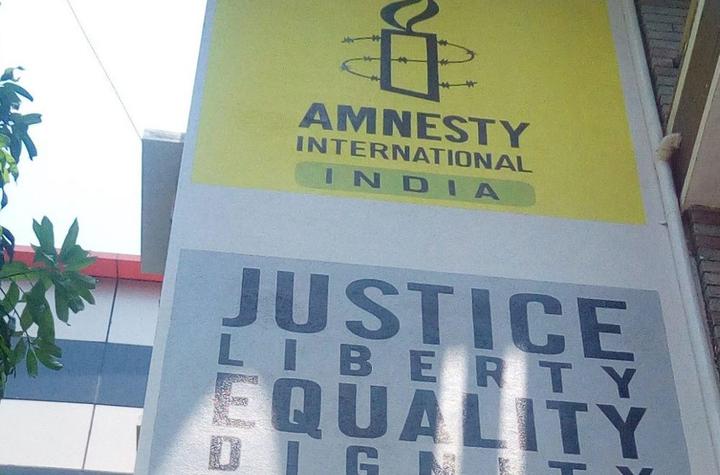Author: Prof. Engr. Zamir Ahmed Awan, Founding Chair GSRRA, Sinologist (ex-Diplomat), Editor, Analyst, Non-Resident Fellow of CCG (Center for China and Globalization). (E-mail: awanzamir@yahoo.com).
AMNESTY INTERNATIONAL IS A GLOBAL MOVEMENT FOR HUMAN RIGHTS. WHEN INJUSTICE HAPPENS TO ONE PERSON, IT MATTERS TO US ALL.
In the three years since 5 August 2019, the Indian government has drastically intensified the repression of the people of Jammu & Kashmir, including journalists and human rights defenders by subjecting them to multiple human rights violations. These violations include restrictions on rights to freedom of opinion and expression; to liberty and security of person; to movement; to privacy; and to remedy and access to justice. The authorities have committed these violations with absolute impunity.
The Indian government claims their actions are a legitimate response to “terrorism”. However, their actions cannot be considered a proportionate response to the purported threat of terrorism and so constitute human rights violations. While national security is recognized by international human rights law as a legitimate justification for the restriction of certain human rights, such restrictions are strictly circumscribed.
Firstly, national security may be invoked to justify measures limiting certain rights only when they are taken to protect the existence of the nation or its territorial integrity or political independence against force or threat of force. Furthermore, national security cannot be used as a pretext for imposing vague or arbitrary limitations and may only be invoked when there exist adequate safeguards and effective remedies against abuse. International standards are also clear that the systematic violation of human rights undermines true national security and may jeopardize international peace and security. A state responsible for such violation shall not invoke national security as a justification for measures aimed at suppressing opposition to such violation or at perpetrating repressive practices against its population.
Secondly, even where national security can legitimately be invoked as a justification for restricting certain rights, the measures introduced must be provided for by law, and must meet the requirements of necessity and proportionality. This means that they must not go any further than is required by the exigencies of the situation, and that they must not do more harm than good.
Specifically, with regard to limitations on the right to freedom of expression, the UN Human Rights Committee is clear that “Extreme care must be taken by States parties to ensure that treason laws and similar provisions relating to national security, whether described as official secrets or sedition laws or otherwise, are crafted and applied in a manner that conforms to the strict requirements of paragraph 3.” Paragraph 3 of Article 19 of the ICCPR limits restrictions to those that are provided by law and strictly necessary. The Human Rights committee goes on to provide that “It is not compatible with paragraph 3, for instance, to invoke such laws to suppress or withhold from the public. Press Information Bureau, Government of India, Parliament approves Resolution to repeal Article 370; paves way to truly integrate J&K with Indian Union, 6 August 2019.
Siracusa Principles on the Limitation and Derogation Provisions in the International Covenant on Civil and Political Rights; Principle 1(B) (VI) (29).
Siracusa Principles, Principle 1(B) (VI) (32)
Siracusa Principles, Principle 1(B) (VI) (32)
UN Human Rights Committee (UNHRC), “General Comment No. 34: Article 19: Freedoms of opinion and expression,” para 30
Amnesty International information of legitimate public interest that does not harm national security or to prosecute journalists, researchers, environmental activists, human rights defenders, or others, for having disseminated such information.”
These measures of relentless interrogations, arbitrary travel bans, administrative detention and repressive media policies and blocking access to human rights commission documented in the briefing prevent journalists and human rights defenders in Jammu & Kashmir from communicating freely about the situation and denies them meaningful access to the region, hereby infringing on people's right to access to information.
Amnesty International is calling on the Indian government to immediately release those arbitrarily detained under administrative detention and other repressive laws and ensure that they are tried promptly and fairly in a regular court. The government must also drop all politically motivated charges against journalists and human rights defenders arrested for exercising their freedom of expression and remove the unjust barriers placed on the people of Jammu & Kashmir from expressing themselves freely and provide them access to meaningful remedy and justice. The Indian government must also take steps to increase the representation and participation of the people of Jammu & Kashmir in decision-making processes. The government’s efforts to put in place unlawful surveillance measures, arbitrary detention, and restrictions to freedom of expression and simultaneously conceal its actions in Jammu & Kashmir clearly violate international human rights law. Accordingly, the international community must hold the Indian government accountable for the human rights violations it has been committing with absolute impunity in Jammu & Kashmir by calling for an immediate and independent investigation into such violations - not least because it reflects so poorly that a member of the Human Rights Council is acting with such impunity.
India has been exposed by the Amnesty International already. The world has seen the real face of India, it is no longer a democratic or secular state. It has already been transformed a dictator, and extremist Hindu state.
(ASIA PACIFIC DAILY)
